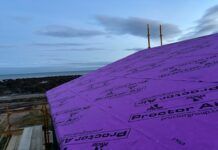Concrete roof tile manufacturer Russell Roof Tiles has warned of incoming disruption for the construction sector if the country adopts proposed changes outlined in European legislation for fixing requirements of UK manufactured roof tiles and slates, which is set to be introduced in 2024.
The company’s warnings of skyrocketing costs follows current challenges the industry is facing as a result of Brexit and COVID-19, such as driver shortages and rising material prices.
Potential changes
The Roof Tile Association (RTA) is currently analysing the extent of the problem and examining how many more fixings might be required under the new definition, or whether the current fixings would be suitable. The team of technical experts are also evaluating the impact on dry ridge / hip and verge systems.
Meanwhile, Russell Roof Tiles’ own early assessments indicate load increases could vary from 30% to 160% across the different styles of mono pitch roofs, and most of its product ranges would be impacted in some way.
The firm believes that the UK should resist adopting the BS EN 1991-1-4: 2005 + A1: 2021 changes because it will have a detrimental impact on roofing contractors across the country as well as on British roof-tile manufacturers.
‘Perfect storm’
Although the Confederation of British Industry (CBI) is predicting the UK economy will reach pre-pandemic levels by the end of 2021, other experts have warned of a ‘perfect storm in construction’.
Mark Parsons, technical director at Russell Roof Tiles, believes this ‘perfect storm’ will be further compounded if the UK government does not appropriately consider the implications of BS EN 1991-1-4: 2005 + A1: 2021. This forms part of the Eurocode series and the European standard for wind actions on structures, which is currently undergoing its five-year review.
He explained: “Despite leaving the EU, there are still best practice standards we must adhere to wherever possible. Not only do they provide a common language for owners, operators, users, designers, contractors, and manufacturers, but they also build up trust across supply chains and remove technical impediments to ensure greater product interoperability.
“In the case of BS EN 1991-1-4: 2005 + A1: 2021, which relates to all aspects of the structural design and development of buildings, there are major implications for the calculated design wind loads acting on roof tiles, slates and their accessories. Under the proposals, the current definition for wind velocity calculations and the pressure it exerts on a structure would no longer be applicable in the UK and Ireland.”
Mark continued: “Using the suggested alternative definition means there would be a significant increase in the number of fixings required for both roof tiles and accessories. In the worst-case scenario, some fixings may be deemed inadequate, causing specific tiles or product ranges to become obsolete.
“The net effect of the proposed changes associated with the cost of additional fixings, increased labour and subsequent additional build time will make UK roofs far more costly to construct.”
Mark concluded: “Ever since the government announced the ‘build back better’ strategy following lockdown, there has been an incredible boom within the construction sector, with output rising significantly across all areas. The last thing it should therefore be doing is putting a spanner in the works elsewhere.
“This is about taking a pragmatic approach and understanding that if something is not broken, there is simply no need to try and fix it. UK roof tiles and fixings have performed safely and effectively since they were last assessed under BS 5534 seven years ago.
“If Brexit is about revitalising British manufacturing, then we need to be allowed to focus on responding to market needs and ensuring our future sustainability; not factoring into already heavy workloads a brand-new product development programme driven entirely by the over-zealous application of bureaucratic EU requirements.”
>>You can read more about how Brexit is impacting the sector in the news here.




